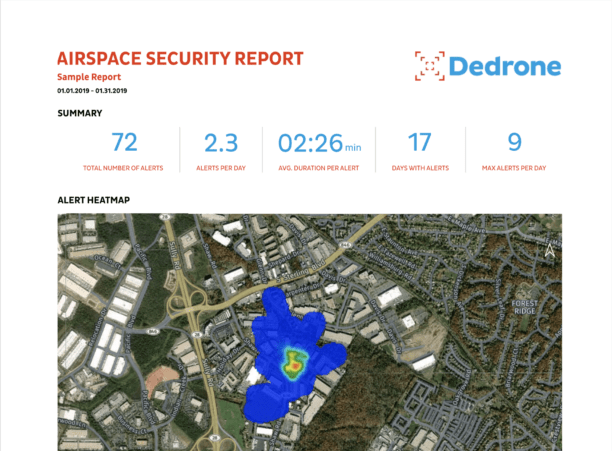Security at major sports events has always been a complex operation – but now, event organizers around the world are adding airspace security to their list of requirements, in order to prevent unwanted drones from taking unauthorized images or disrupting play. At this year’s 110th playing of the RBC Canadian Open golf championship, local police used radio frequency sensors to detect and classify drones up to a mile away with the Dedrone system – and you can see it at work.
The following is from a Dedrone press release.
When planning security around the RBC Canadian Open golf championship at Hamilton Golf & Country Club in June, Hamilton Police Service put a new spin on the definition of high-tech security.
They incorporated new technology to detect and track drones in the area.
Working with airspace security company Dedrone, Hamilton Police Service established a drone detection strategy to ensure drones did not threaten spectators, distract play or record unauthorized footage of the televised event. The system involved the use of four of Dedrone’s radio frequency sensors to detect and classify drones up to one mile away,feeding information into its DroneTracker software platform. Hamilton Police invited staff and students from Mohawk College to install and operate the system.
“This was a great opportunity for our students to experience the technology, see how it works and see the importance of its use at an event like this,” says Matthew Shelley, a technologist at Mohawk College. The Hamilton-based college offers drone, or remotely piloted aircraft systems (RPAS), certification programs for security and industry applications and conducts applied research projects using drones with partners in a number of industries.
“Hamilton Police and Mohawk College have along-standing positive working relationship. Mohawk College, with the support of Dedrone technology, Garda World Security, Golf Canada and PGA Canada, made working together on event security,as it relates to drone activity, a natural choice,” says Inspector David Hennick, the Incident Commander for the event and representative from the Hamilton Police Service. “This partnership enhanced security at the event for all spectators, professional athletes, volunteers and staff and provided technology that would have otherwise been unavailable to the Hamilton Police Service.”
In the days leading up to the event,Dedrone completed testing and training with Mohawk College and Hamilton Police.During these training sessions, the group located and tracked down unauthorized drone pilots throughout the golf course. The drone hobbyists were educated about the risks of flying in a no-fly zone during tournament play. Unauthorized drone use in areas of heavy crowds can jeopardize public safety and interrupt first responders in emergency situations. They can also record illegal image sand video footage at events, such as the televised golf tournament.
This community outreach and education proved effective as there were no additional unauthorized drone flights throughout the four-day event.
“Dedrone’s drone detection technology can be quickly integrated and deployed at sporting events, and provides actionable information for security teams to diagnose airspace activity and address any threats,” says Joerg Lamprecht, CEO and co-founder of Dedrone. “Major events like the RBC Canadian Open require multiple layers of security, and Mohawk College and Hamilton Police were proactive in extending their situational awareness to the lower airspace. Drone pilots will continue to fly in protected airspace, whether intentionally or unintentionally. Security providers for any open-air event, whether it be a golf tournament, parade, marathon or otherwise,must take action to protect the public from unauthorized drones.”
Drones are revolutionizing the way work is done.From construction projects to aerial photography to emergency response activities, drones are quickly becoming an essential tool for capturing images and collecting data. This project between Hamilton Police Service, Dedrone, Garda World Security, Golf Canada and PGA Canada is an excellent example of how drone technology can be applied to the benefit of all partners in the execution of a safe and secure event.
Miriam McNabb is the Editor-in-Chief of DRONELIFE and CEO of JobForDrones, a professional drone services marketplace, and a fascinated observer of the emerging drone industry and the regulatory environment for drones. Miriam has penned over 3,000 articles focused on the commercial drone space and is an international speaker and recognized figure in the industry. Miriam has a degree from the University of Chicago and over 20 years of experience in high tech sales and marketing for new technologies.
For drone industry consulting or writing, Email Miriam.
TWITTER:@spaldingbarker
Subscribe to DroneLife here.
